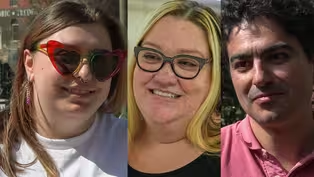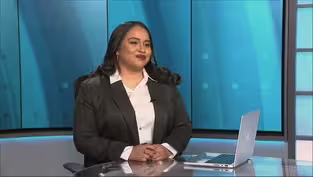VPM News Focal Point
Parenting trans youth in a contentious political climate
Clip: Season 2 Episode 3 | 7m 57sVideo has Closed Captions
Why is parental support so important for the health and safety of transgender youth?
Transgender policies in Virginia schools have become a political flash point impacting families across the commonwealth. At the same time, many parents are learning about the trans community, what it means to be transgender, and how they can help their own children. Why is parental support so critical to the health and safety of trans youth? One family took us along on their journey.
Problems playing video? | Closed Captioning Feedback
Problems playing video? | Closed Captioning Feedback
VPM News Focal Point is a local public television program presented by VPM
The Estate of Mrs. Ann Lee Saunders Brown
VPM News Focal Point
Parenting trans youth in a contentious political climate
Clip: Season 2 Episode 3 | 7m 57sVideo has Closed Captions
Transgender policies in Virginia schools have become a political flash point impacting families across the commonwealth. At the same time, many parents are learning about the trans community, what it means to be transgender, and how they can help their own children. Why is parental support so critical to the health and safety of trans youth? One family took us along on their journey.
Problems playing video? | Closed Captioning Feedback
How to Watch VPM News Focal Point
VPM News Focal Point is available to stream on pbs.org and the free PBS App, available on iPhone, Apple TV, Android TV, Android smartphones, Amazon Fire TV, Amazon Fire Tablet, Roku, Samsung Smart TV, and Vizio.
Providing Support for PBS.org
Learn Moreabout PBS online sponsorshipSTEPHANIE: So we're actually both accountants, that's how we met.
We met when I interviewed him for his job.
CHAD: Long, long time ago.
COLTON: Oh!
STEPHANIE: We have two beautiful, healthy children who are completely unique in their own ways.
Ellie loves art.
She loves hanging out with her hermit crab.
She loves- CHAD: Watching "SpongeBob".
STEPHANIE: Watching "SpongeBob".
CHAD: And Colton, typical boy stuff.
"Let's talk sports.
Let's go in the backyard and kick the ball."
STEPHANIE: For me, we're living what I kind of always imagined to be the dream.
(indistinct chatter) Ellie, early on, age two, started with things like accoutrement.
There was always something extra, like a necklace.
CHAD: She always had flair.
STEPHANIE: And then it just amplified and increased in intensity and frequency as time went on.
There was a long period of time where she insisted on wearing a cape.
I can't tell you how many times she would actually put a pair of pants on her head or a towel and fashion it so that to her it felt like long hair.
CHAD: We didn't realize it then.
STEPHANIE: And we also did not realize at the time, because we just didn't know, that this is very common behavior for transgender children who were assigned male at birth.
ELLIE: I was very into fashion and dresses and makeup and hair and stuff like that.
I kind of knew since I was five or six years old that I was a girl from that age.
Just, I was very scared to tell everybody 'cause I thought no one would accept me like that.
STEPHANIE: I mean, this was a little uncomfortable at the time.
We didn't know...
I had been for probably three years, every now and then I would Google ‘signs of transgender kids early on.
She never came out and said, ‘I'm a girl, but she showed us in a thousand different ways.
There was a day when she was doing flips on the bed in a dress and she had said that when she went to school, she wanted to wear girl clothes for the upcoming school year.
I said, ‘Do you feel like a girl inside?
And she just looked at me and kind of meekly said, ‘Yes.
I hope I did a good job of masking my reaction, but inside it's like I felt like I was on fire, like, ‘Oh, God, just wave of panic.
There's nothing wrong with Ellie, there's never been anything wrong with Ellie, but knowing what we would be up against from other people was the real problem.
CHAD: All I could focus on was, ‘I don't know what this means.
I know how society treats it, but I don't know anything about it, but I love my child, so it doesn't matter.
All I ever wanted was for her to just be herself, right like, for her to feel comfortable, and I didn't care what that was.
COLTON: Press the A button.
Are you going to score a goal for him?
ELLIE: He's pretty nice.
Oh, look at that!
COLTON: At first I never knew about it, but then I started seeing the dresses and I was like, ‘What's going on?
And then I figured out, ‘Okay, so you want to be a girl, you can be a girl, I don't care.
You just do you.
STEPHANIE: Initially transitioning for a child is just social and for two years, that's all it was.
So we came out and for two years it was just name, pronouns, and really her appearance, how she dresses.
That was it.
ELLIE: It's very nice to have parents that are very supportive of me because I know some kids don't have supportive parents and what happens is sometimes they'll run away and end up homeless.
And I just feel like, ‘Why did you have kids if you're not going to accept them as who they are?
SHANNON McKAY: Well, I'm Shannon McKay, I use she/her pronouns, Executive Director and also the Co-Founder of He She Ze and We.
I have my own trans kid, that's why I do this work.
Family support is the number one protective factor for trans youth.
Sadly, only one in three trans or non-binary youth report that their family is supportive and affirming of their gender identity.
And that wrecks me.
That's why we do this work, because we can do better than that.
The Trevor Project in 2021 reported 42% of LGBTQ youth considered attempting suicide last year, and out of that number 50% were trans or non-binary.
When a young person tells us who they are, we need to believe them.
It's their truth.
It is very hard for kids to come out to their parents or to a trusted adult or to a friend and the best thing that we can do is say, ‘I believe you, I trust that you know yourself, and I'm here for you.
CHAD: What I learned is how important advocacy is.
It's not enough to just let things happen right its It's providing that support.
It's providing that affirmation.
It's providing that ‘I see you, I love you and who you are, and there are others like you and we love them too.
ELLIE: I came to school one day and I was like, ‘Hey guys I have a new name and I'm a girl now.
Everyone at school was like, ‘What?
You can't do that.
That's not what people do.
That's not normal.
It was very difficult, but then at the end of the day, I'm me.
People don't get to tell me who I am.
STEPHANIE: She's just a girl, just let her be a girl, and I'm like, yeah, she's just a girl, but there are 11 bills being proposed through the Virginia legislature this year against kids like her.
We can't just wait and hope that things will change.
Things only change because people work for change.
ELLIE: I really don't want other kids to be scared.
I really want people to feel everyone's going to accept them and they're going to be safe.
Why be mean for no reason, just because I'm not who you want me to be?
COLTON: I would say to the bullies, ‘Back off.
We're stronger than you think.
We have every right that we were born with and you can't take that away from us.
STEPHANIE: I love that picture because it's like, here's Mr. America and then here's Ellie with this get up.
CHAD: We just want to live, we just want to be us, and it just so happens this particular topic is getting more attention.
Transgender people have existed forever.
It's finally getting the light of day that it probably always should have.
We finally have social momentum to allow these conversations to happen.
STEPHANIE: There's no such thing as the normal family, but most people would just assume we're just a regular family- CHAD: In the suburbs.
Just whatever comes along with that, that's what that is.
But back to Ellie, its like, you know, I'm proud of her.
Right, I love the fact that we can provide an environment where she can be herself and she can be her best self.
Gender and Identity | People of Virginia
Video has Closed Captions
Clip: S2 Ep3 | 1m 13s | People of Virginia discuss gender, identity and legal protections for the LGBTQ community. (1m 13s)
In Focus | Dr. Erica Anderson and Narissa Rahaman
Video has Closed Captions
Clip: S2 Ep3 | 15m 28s | Narissa Rahaman and Dr. Erica Anderson discuss school policies in Virginia for LGBTQ youth (15m 28s)
Protecting the right to same-sex marriage in Virginia
Video has Closed Captions
Clip: S2 Ep3 | 1m 38s | Virginia’s constitution bans same sex marriage, while federal law protects that right. (1m 38s)
Reflecting with relief on how far they’ve come
Video has Closed Captions
Clip: S2 Ep3 | 4m 27s | The LGBTQ+ community is growing as public acceptance increases (4m 27s)
Richmond Triangle Players Celebrates Queer Artistry
Video has Closed Captions
Clip: S2 Ep3 | 3m 31s | Founded in ‘93 Richmond Triangle Players celebrates queer artistry and LGBTQ+ experiences. (3m 31s)
Supporting families with transgender loved ones
Video has Closed Captions
Clip: S2 Ep3 | 8m 17s | He She Ze and We supports families with transgender loved ones. (8m 17s)
Providing Support for PBS.org
Learn Moreabout PBS online sponsorship
- News and Public Affairs

Top journalists deliver compelling original analysis of the hour's headlines.

- News and Public Affairs

FRONTLINE is investigative journalism that questions, explains and changes our world.












Support for PBS provided by:
VPM News Focal Point is a local public television program presented by VPM
The Estate of Mrs. Ann Lee Saunders Brown





